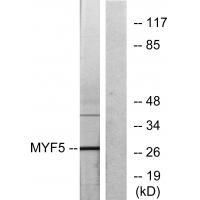
| WB | 咨询技术 | Human,Mouse,Rat |
| IF | 咨询技术 | Human,Mouse,Rat |
| IHC | 咨询技术 | Human,Mouse,Rat |
| ICC | 技术咨询 | Human,Mouse,Rat |
| FCM | 咨询技术 | Human,Mouse,Rat |
| Elisa | 咨询技术 | Human,Mouse,Rat |
| Aliases | MYF5; myogenic factor 5; |
| Entrez GeneID | 4617; |
| WB Predicted band size | 28kDa |
| Host/Isotype | Rabbit IgG |
| Antibody Type | Primary antibody |
| Storage | Store at 4°C short term. Aliquot and store at -20°C long term. Avoid freeze/thaw cycles. |
| Species Reactivity | Human,Mouse |
| Immunogen | Synthesized peptide derived from inetrnal of human MYF5. |
| Formulation | Purified antibody in PBS with 0.05% sodium azide. |
+ +
以下是关于MYF5抗体的3篇代表性文献及其摘要内容的简要概括:
---
1. **文献名称**:*MyoD or Myf-5 is required for the formation of skeletal muscle*
**作者**:Rudnicki, M. A., et al.
**摘要**:该研究利用基因敲除小鼠模型和MYF5抗体检测,证明MYF5与MyoD在骨骼肌发育中的关键作用。研究发现,MYF5缺失会导致肌源性前体细胞分化障碍,而抗体标记进一步揭示了其在胚胎期肌肉祖细胞中的特异性表达。
---
2. **文献名称**:*Single-cell analysis of MYF5+ progenitor cell dynamics in skeletal muscle regeneration*
**作者**:Yin, H., et al.
**摘要**:通过MYF5抗体标记和单细胞测序技术,研究揭示了MYF5+肌肉干细胞在损伤修复中的异质性。抗体特异性验证表明,MYF5与PAX7共表达于静息态卫星细胞,提示其在维持干细胞池中的功能。
---
3. **文献名称**:*Distinct regulatory roles of MYF5 and MYOG in myogenesis*
**作者**:Sambasivan, R., Tajbakhsh, S.
**摘要**:研究使用MYF5抗体和遗传谱系追踪技术,比较了MYF5与肌生成素(MYOG)在肌细胞分化中的功能差异。结果显示,MYF5主要调控祖细胞增殖,而MYOG驱动终末分化,抗体染色证实两者在发育阶段的时空表达分离。
---
4. **文献名称**:*MYF5 expression in rhabdomyosarcoma: Diagnostic and prognostic implications*
**作者**:Kuang, S., et al.
**摘要**:该文献评估了MYF5抗体在横纹肌肉瘤中的诊断价值,发现MYF5高表达与胚胎型肿瘤亚型相关。抗体免疫组化结果显示,MYF5可作为区分肌肉源性肿瘤与其他软组织肉瘤的标志物。
---
以上文献涵盖了MYF5抗体在基础发育生物学、干细胞研究及临床诊断中的应用。如需具体文章链接或发表年份,可进一步补充说明。
MYF5 (myogenic factor 5) is a member of the myogenic regulatory factor (MRF) family, which includes MYOD, MYOG, and MRF4. These transcription factors play pivotal roles in skeletal muscle development, differentiation, and regeneration. MYF5 is specifically involved in the determination and early differentiation of myogenic precursor cells during embryogenesis. It is expressed in somites and skeletal muscle progenitors, acting upstream of MYOD and MYOG to establish myoblast identity.
Antibodies targeting MYF5 are essential tools for studying myogenesis, muscle stem cell biology, and disorders like muscular dystrophy or rhabdomyosarcoma. They enable the detection and localization of MYF5 protein in tissues or cultured cells via techniques such as Western blot, immunohistochemistry, and immunofluorescence. Researchers also use MYF5 antibodies to characterize myogenic lineages in developmental studies or regenerative medicine models, including pluripotent stem cell differentiation.
The specificity and reliability of MYF5 antibodies are critical due to homology among MRF family members. Many commercially available antibodies are validated using knockout controls or siRNA-mediated knockdown to confirm target selectivity. Understanding MYF5 dynamics helps unravel mechanisms of muscle repair, disease pathology, and potential therapeutic strategies. Its role as an early myogenic marker continues to make it a focal point in muscle-related research.
×